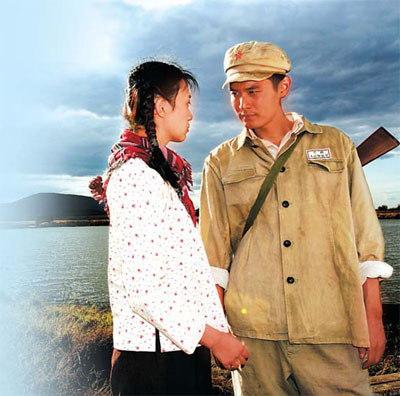By Cheng Anqi (China Daily)

The Great Northern Wilderness is a love triangle involving a young woman (Liang Linlin, pictured left), a soldier (Wang Yu, pictured) and a war veteran (Zhu Yawen).
The Korean War became the backdrop for the most-watched American TV show in history. When the final episode of M.A.S.H aired in 1983, after a record-breaking 11 seasons, it attracted more than 105 million US viewers, and millions more around the world. The comedy/drama helped shape Western views of the Korean War, but the Chinese perception of this three-year conflict is very different.
Next year, the Korean War will be the backdrop of a new Chinese TV series, which focuses on the lives and loves of young people in the northern part of the country in the 1950s.
Compared with other periods in China's modern history, there have been very few dramas focusing on this era. For this reason, renowned television director Zhang Jianxin believes his new series will be a winner in 2009.
Zhang also believes his 20-part The Great Northern Wilderness (Bei Da Huang) series will appeal to the most lucrative television demographic - people aged in the 30s and 40s - and will be a commercial success.
He also says the story of young men and women battling against the elements will encourage today's generation during the economic crisis.
"China's large population and the breakout of Korean War caused food shortage in 1950s," says Zhang.
"This led to about 100,000 retired service people and hundreds of thousands of young people answering the call by the Chinese government to resettle in the wild lands of northern China.
"It is the selfless spirit and dedication of the farm workers that are the most admirable of all, as they have devoted their lives and risked untold hardship to build an agricultural miracle."
The new series is a love triangle, in which a battle veteran (Zhu Yawen) falls in love with a girl (Liang Linlin), who strongly resembles his dead fiance, a victim of the civil war.
The young lady, however, falls for another soldier, who escorts her to the wasteland from city capital.
Zhang hopes the new series will be as successful as his last year's smash-hit TV drama Breaking Through (Chuang Guandong), which was also about army life.
Instead of setting the scene on the battlefront, like his last series, The Great Northern Wilderness is shot in the northeastern Heilongjiang province, a vast expanse of land, which was sparely inhabited in the 1950s, when the Korean War had just begun.
More than half a million young men and women, including demobilized army officers and solders and high school graduates marched into this great wilderness, on the border of Korea.
They cultivated farmland and followed their own aspirations to serve emerging New China and solve food shortages at the time.
While researching the show, Zhang says there was little documentation to draw from, but he hoped his new series would help today's generation be more grateful for the efforts of their grandfathers and grandmothers.
"While later generations now enjoy the prosperity that their predecessors created decades ago, few of them know the stories of these post-war men and women, who made an unforgettable contribution to China's history and toward helping their fellow citizens," he says.
"There was very little material like documentaries and literature covering their daily lives in such tough times, so the series will help to fill a vacancy in that history."






No comments:
Post a Comment